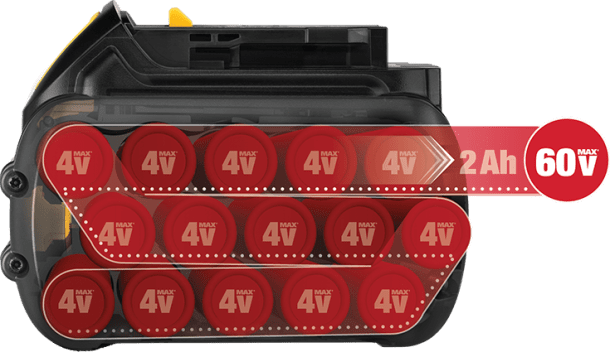Rechargeable batteries have become an integral part of our daily lives, powering everything from remote controls to high-performance power tools. But when it comes to choosing between Lithium-ion (Li-ion) and Nickel-Metal Hydride (NiMH) rechargeable batteries for power tools, the decision can be tricky. Both types have their strengths and weaknesses. Let’s dive into the details to help you make an informed choice.

Understanding Lithium-ion Batteries
Lithium-ion batteries are well-known for their high energy density. This means they can store more energy in a smaller space. Imagine you’re working on a project that requires continuous use of a power drill. A Li-ion battery will keep your drill running longer without needing a recharge. These batteries are also lightweight, making your power tools easier to handle.
The Benefits of NiMH Batteries
On the other hand, NiMH batteries are robust and reliable. They might not pack the same energy density as Li-ion batteries, but they have a steady discharge rate. This characteristic is crucial for tasks that need a consistent power output. For instance, if you’re using a circular saw, an NiMH battery will provide a stable performance throughout the job.
Real-life Experience with Lithium-ion Batteries
Let’s talk about my friend John, a woodworking enthusiast. John swears by his Li-ion powered tools. One day, he was building a custom bookshelf for his daughter. Halfway through, he realized he hadn’t charged his spare batteries. Thankfully, his Li-ion batteries lasted longer than expected, allowing him to finish the project without a hitch. John’s experience highlights the convenience of Li-ion batteries, especially for extended use.
My Encounter with NiMH Batteries
Conversely, my experience with NiMH batteries has been equally positive. I remember working on a backyard deck project. I was using a heavy-duty hammer drill powered by an NiMH battery. The drill performed consistently, delivering the same power from start to finish. There was no noticeable drop in performance, which made the task much smoother.
Environmental Impact of Rechargeable Batteries
One of the significant advantages of rechargeable batteries is their positive impact on the environment. By opting for rechargeable options, we reduce the number of disposable batteries ending up in landfills. This choice contributes to less environmental pollution and promotes sustainability. Rechargeable batteries, regardless of the type, are a step toward a greener planet.
Comparing Charge Cycles and Longevity
When it comes to longevity, Li-ion batteries generally have a higher number of charge cycles. This means they can be recharged more times than NiMH batteries before their performance starts to degrade. If you use your power tools frequently, this could translate to better long-term value. However, NiMH batteries are no slouches either, offering respectable longevity for most trade professionals and DIY enthusiasts.
Cost Considerations
Price is always a factor when choosing batteries. Li-ion batteries tend to be more expensive upfront compared to NiMH batteries. But considering their longer lifespan and higher energy density, they often provide better value over time. NiMH batteries, while cheaper initially, might need replacing sooner, depending on usage.
Safety Aspects
Safety is another critical factor. Li-ion batteries have a reputation for being sensitive to extreme conditions. Overcharging, overheating, or physical damage can lead to potential hazards. Manufacturers have improved safety features significantly, but it’s always wise to handle Li-ion batteries with care. NiMH batteries, while generally safer, can suffer from the “memory effect,” where they lose their maximum energy capacity if not discharged fully before recharging. This isn’t a safety issue per se, but it does affect performance.
Practical Tips for Battery Maintenance
Regardless of the type, proper maintenance of rechargeable batteries can extend their life. Here are some practical tips:
- Avoid overcharging or deep discharging your batteries.
- Store them in a cool, dry place.
- Clean the contacts regularly to ensure efficient power transfer.
Final Thoughts
In the end, the choice between Lithium-ion and NiMH rechargeable batteries depends on your specific needs. If you require high energy density and lightweight performance, Li-ion batteries are the way to go. For steady power output and reliability, NiMH batteries are a solid choice. Both options have their merits and can serve you well in different scenarios. Next time you’re in the market for rechargeable batteries, consider your usage patterns, budget, and the specific demands of your power tools. Making an informed choice will ensure you get the best performance and value from your investment.
For more information on the benefits of using rechargeable batteries, click here.
Conclusion
Whether you’re a DIY enthusiast or a professional tradesperson, choosing the right rechargeable battery can significantly impact your work efficiency and satisfaction. By understanding the strengths and limitations of both Lithium-ion and NiMH batteries, you can make a more informed decision that aligns with your needs and preferences. Remember, the best rechargeable battery is the one that fits seamlessly into your workflow, offering the power and reliability you need to get the job done right.
 Markus Schimbaeck has been responsible for global purchasing in the ICT sector since 2003. During this time, he was able to build up a network of suppliers and take advantage of all the benefits of a global supply chain. In 2017 he focused on his own company with hardware and software sales.
Markus Schimbaeck has been responsible for global purchasing in the ICT sector since 2003. During this time, he was able to build up a network of suppliers and take advantage of all the benefits of a global supply chain. In 2017 he focused on his own company with hardware and software sales.




Join the conversation: